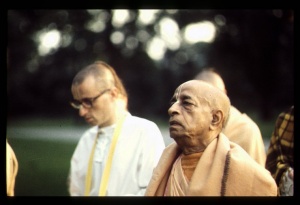SB 7.15.57: Difference between revisions
m (1 revision(s)) |
No edit summary |
||
| Line 1: | Line 1: | ||
{{info | {{info | ||
|speaker= | |speaker=Nārada Muni | ||
|listener=King | |listener=King Yudhiṣṭhira | ||
}} | }} | ||
[[Category:Srimad-Bhagavatam - Canto 07 Chapter 15]] | |||
[[Category:Bhagavatam Verses Spoken by Narada Muni - Vanisource|071557]] | |||
<div style="float:left">'''[[Srimad-Bhagavatam]] - [[SB 7|Seventh Canto]] - [[SB 7.15: Instructions for Civilized Human Beings|Chapter 15: Instructions for Civilized Human Beings]]'''</div> | |||
<div style="float:right">[[File:Go-previous.png|link=SB 7.15.56]] '''[[SB 7.15.56]] - [[SB 7.15.58]]''' [[File:Go-next.png|link=SB 7.15.58]]</div> | |||
{{RandomImage}} | |||
==== TEXT 57 ==== | ==== TEXT 57 ==== | ||
<div | <div class="verse"> | ||
ādāv ante janānāṁ sad | :ādāv ante janānāṁ sad | ||
bahir antaḥ parāvaram | :bahir antaḥ parāvaram | ||
jñānaṁ jñeyaṁ vaco vācyaṁ | :jñānaṁ jñeyaṁ vaco vācyaṁ | ||
tamo jyotis tv ayaṁ svayam | :tamo jyotis tv ayaṁ svayam | ||
</div> | </div> | ||
| Line 17: | Line 22: | ||
==== SYNONYMS ==== | ==== SYNONYMS ==== | ||
<div | <div class="synonyms"> | ||
''ādau''—in the beginning; ''ante''—at the end; ''janānām''—of all living entities; ''sat''—always existing; ''bahiḥ''—externally; ''antaḥ''—internally; ''para''—transcendental; ''avaram''—material; ''jñānam''—knowledge; ''jñeyam''—the objective; ''vacaḥ''—expression; ''vācyam''—the ultimate object; ''tamaḥ''—darkness; ''jyotiḥ''—light; ''tu''—indeed; ''ayam''—this one (the Supreme Lord); ''svayam''—Himself. | |||
</div> | </div> | ||
| Line 24: | Line 29: | ||
==== TRANSLATION ==== | ==== TRANSLATION ==== | ||
<div | <div class="translation"> | ||
He who exists internally and externally, at the beginning and end of everything and of all living beings, as that which is enjoyable and as the enjoyer of everything, superior and inferior, is the Supreme Truth. He always exists as knowledge and the object of knowledge, as expression and the object of understanding, as darkness and as light. Thus He, the Supreme Lord, is everything. | He who exists internally and externally, at the beginning and end of everything and of all living beings, as that which is enjoyable and as the enjoyer of everything, superior and inferior, is the Supreme Truth. He always exists as knowledge and the object of knowledge, as expression and the object of understanding, as darkness and as light. Thus He, the Supreme Lord, is everything. | ||
</div> | </div> | ||
| Line 31: | Line 36: | ||
==== PURPORT ==== | ==== PURPORT ==== | ||
<div | <div class="purport"> | ||
Here the Vedic aphorism sarvaṁ khalv idaṁ brahma is explained. It is also explained in the catuḥ-ślokī Bhāgavatam [SB 2.9.33/34/35/36]. Aham evāsam evāgre. The Supreme Lord existed in the beginning, He exists after the creation and maintains everything, and after destruction everything merges in Him, as stated in Bhagavad-gītā ([[BG prakṛtiṁ yānti māmikām | Here the Vedic ''aphorism sarvaṁ khalv idaṁ brahma'' is explained. It is also explained in the ''catuḥ-ślokī'' [[Srimad-Bhagavatam|''Bhāgavatam'']] [[SB 2.9.33|2.9.33/34/35/36]]. ''Aham evāsam evāgre''. The Supreme Lord existed in the beginning, He exists after the creation and maintains everything, and after destruction everything merges in Him, as stated in [[Bhagavad-gita As It Is (1972)|''Bhagavad-gītā'']] ([[BG 9.7 (1972)|9.7]] ''prakṛtiṁ yānti māmikām''). Thus the Supreme Lord is actually everything. In the conditioned state, we are bewildered in our understanding, but in the perfect stage of liberation we can understand that Kṛṣṇa is the cause of everything. | ||
:īśvaraḥ paramaḥ kṛṣṇaḥ | :''īśvaraḥ paramaḥ kṛṣṇaḥ'' | ||
:sac-cid-ānanda-vigrahaḥ | :''sac-cid-ānanda-vigrahaḥ'' | ||
:anādir ādir govindaḥ | :''anādir ādir govindaḥ'' | ||
:sarva-kāraṇa-kāraṇam | :''sarva-kāraṇa-kāraṇam'' | ||
"Kṛṣṇa, who is known as Govinda, is the supreme controller. He has an eternal, blissful, spiritual body. He is the origin of all. He has no other origin, for He is the prime cause of all causes." ( | "Kṛṣṇa, who is known as Govinda, is the supreme controller. He has an eternal, blissful, spiritual body. He is the origin of all. He has no other origin, for He is the prime cause of all causes." (BS 5.1) This is the perfection of knowledge. | ||
</div> | </div> | ||
__NOTOC__ | |||
<div style="float:right; clear:both;">[[File:Go-previous.png|link=SB 7.15.56]] '''[[SB 7.15.56]] - [[SB 7.15.58]]''' [[File:Go-next.png|link=SB 7.15.58]]</div> | |||
__NOTOC__ | |||
__NOEDITSECTION__ | |||
Revision as of 15:45, 2 July 2021

A.C. Bhaktivedanta Swami Prabhupada
TEXT 57
- ādāv ante janānāṁ sad
- bahir antaḥ parāvaram
- jñānaṁ jñeyaṁ vaco vācyaṁ
- tamo jyotis tv ayaṁ svayam
SYNONYMS
ādau—in the beginning; ante—at the end; janānām—of all living entities; sat—always existing; bahiḥ—externally; antaḥ—internally; para—transcendental; avaram—material; jñānam—knowledge; jñeyam—the objective; vacaḥ—expression; vācyam—the ultimate object; tamaḥ—darkness; jyotiḥ—light; tu—indeed; ayam—this one (the Supreme Lord); svayam—Himself.
TRANSLATION
He who exists internally and externally, at the beginning and end of everything and of all living beings, as that which is enjoyable and as the enjoyer of everything, superior and inferior, is the Supreme Truth. He always exists as knowledge and the object of knowledge, as expression and the object of understanding, as darkness and as light. Thus He, the Supreme Lord, is everything.
PURPORT
Here the Vedic aphorism sarvaṁ khalv idaṁ brahma is explained. It is also explained in the catuḥ-ślokī Bhāgavatam 2.9.33/34/35/36. Aham evāsam evāgre. The Supreme Lord existed in the beginning, He exists after the creation and maintains everything, and after destruction everything merges in Him, as stated in Bhagavad-gītā (9.7 prakṛtiṁ yānti māmikām). Thus the Supreme Lord is actually everything. In the conditioned state, we are bewildered in our understanding, but in the perfect stage of liberation we can understand that Kṛṣṇa is the cause of everything.
- īśvaraḥ paramaḥ kṛṣṇaḥ
- sac-cid-ānanda-vigrahaḥ
- anādir ādir govindaḥ
- sarva-kāraṇa-kāraṇam
"Kṛṣṇa, who is known as Govinda, is the supreme controller. He has an eternal, blissful, spiritual body. He is the origin of all. He has no other origin, for He is the prime cause of all causes." (BS 5.1) This is the perfection of knowledge.